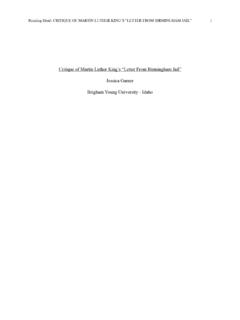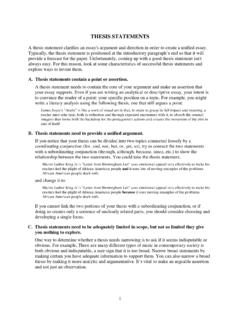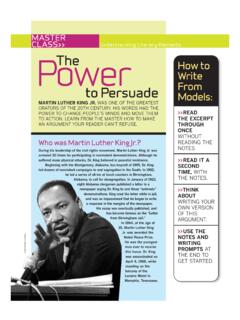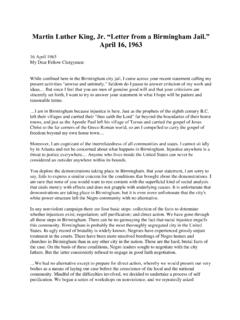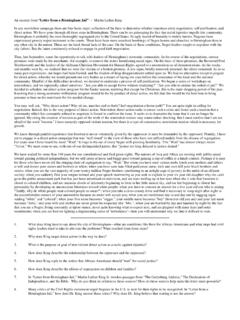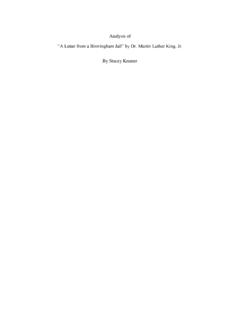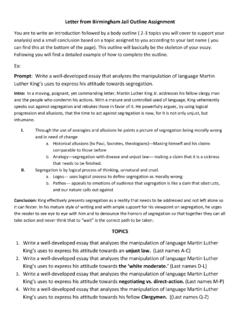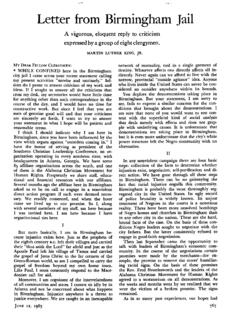Transcription of The Tyranny of Inaction: an Analysis of Letter From a ...
1 1 History 12 Professor Valadez July 29, 2016 The Tyranny of Inaction: an Analysis of Letter From a birmingham jail By the spring of 1963, racial tensions in the American South had reached crisis levels. Nowhere was the crisis more apparent than in the city of Birigham, Alabama, where the systemic racism that was deeply ingrained in the local culture and government was being met with increasing resistance from the local African-American The situation in birmingham became the focus of prominent civil rights activist and religious leader Martin Luther King Jr., who worked with the Southern Christian Leadership Conference (SCLC) to fight racist and segregationist policies in the In April 1963, King and the SCLC launched Project C, an aspirational campaign to rid birmingham of these policies, utilizing nonviolent protests and an economic boycott. Project C was immediately met with resistance and anger from the local government; soon after the protests commenced, Democratic city official T.
2 Eugene Bull Connor unleashed attack dogs on Project C s peaceful King, who was barred from participating in demonstrations by a federal court injunction, was soon arrested for violating the He was incarcerated within the city limits on April 12, From his cell, King 1. birmingham Demonstrations, Civil Rights Digital Library, last modified April 24, 2016, events/birmingham_demonstrations/?Welcom e. 2. Ibid. 3. Ibid. 4. Eric Foner, Introduction to Letter From a birmingham jail , in Voices of Freedom : A Documentary History, ed. Eric Foner (New York: W. W. Norton and Company, Inc., 2014), 268. 5. Letter from birmingham jail , Martin Luther King Jr. and the Global Freedom Struggle, accessed July 23, 2016, 2 7. Ibid. 8. Ibid. penned an open Letter to his fellow clergymen on the margins of a newspaper. King s Letter , later christened Letter From a birmingham jail by historians, revealed his frustration with Caucasians who were sympathetic or ambivalent about King s cause, but were unwilling to condone or participate in his protests.
3 The text of the Letter demonstrates King s deeply held beliefs that social and racial justice can never be achieved through inaction, and that those who chose not to deviate from the status quo were complicit in the political and social oppression of African- Americans. King began his Letter by extending an olive branch to the clergymen who had called his tactics as unwise and untimely, noting that he believed his skeptics were men of genuine good will, [whose] criticisms are sincerely set forth. 6 King responded to their charges with the assertion that, I am in birmingham because injustice is here.. I [am] compelled to carry the gospel of freedom beyond my own home town. Like Paul [of Tarsus], I must constantly respond to the Macedonian call of aid. 7 This biblical analogy conveys King s deep personal investment in helping others defeat institutional injustice. He continues with, .. I am cognizant of the interrelatedness of all communities and states.
4 I cannot sit idly by in Atlanta and not be concerned about what happens in birmingham . Injustice anywhere is a threat to justice everywhere. We are caught in an inescapable network of mutuality, tied in a single garment of destiny. Whatever affects one directly, affects all indirectly. 8 Here, King introduced a central theme of his Letter that instances of localized injustice threaten the sanctity of justice everywhere. He reaffirmed this notion by comparing the United States to a single garment of 6. Martin Luther King Jr., Letter From a birmingham jail , in Voices of Freedom : A Documentary History, ed. Eric Foner (New York: W. W. Norton and Company, Inc., 2014), 268-271. 3 9. Ibid. 10. Daniel Victor, Why All Lives Matter is Such a Perilous Phrase, The New York Times, Jul. 15, 2016. destiny in which every individual forms a thread. If even one thread frays, King implied, the garment will systematically begin to unravel. Having presented his first argument, King proceeded to accuse his critics of selective disapproval: You deplore the demonstrations taking place in birmingham .
5 But your statement, I m sorry to say, fails to express a similar concern for the conditions that brought about the demonstrations.. It is unfortunate that demonstrations are taking place in birmingham , but it is even more unfortunate that the city s white power structure left the Negro community with no alternative. 9 It should be noted that this accusation is strikingly similar to those levied against critics of the modern Black Lives Matter movement; this demonstrates the versatility of the popular contention that critics of social justice movements are unwittingly hindering the movements successes with their intellectual Whether King would have condoned Black Lives Matter s often violent tactics and rhetoric is questionable, but his sentiments on the subject of racial justice were generally aligned with those of the modern movement. King continued his Letter with an impassioned lamentation of the many unjust experiences he shared with his fellow African-Americans: We know through painful experience that freedom is never voluntarily given by the oppressor; it must be demanded by the oppressed.
6 For years now I have heard the word Wait! .. Perhaps it is easy for those who have never felt the stinging darts of segregation to say, Wait. But when you have seen vicious mobs lynch your mothers and fathers at will and drown your sisters and brothers at whim .. when your first name becomes nigger [and] your middle name becomes boy (however old you are) .. then you 4 12. Ibid. will understand why we find it difficult to wait. 11 This portion of King s Letter casts the most revealing light on his emotional state. As he listed off the myriad of offenses that racist whites perpetuated against blacks on a daily basis, his words became increasingly adrenalized. King s eloquent phrasing makes it easy for the reader to empathize with him; indeed, it is difficult to read the Letter from a modern perspective and not feel King s burning anger from over half a century ago permeating one s own conscience. King concluded his Letter with a withering indictment of those who choose safe inaction over rebellion: I must confess that over the past few years I have been gravely disappointed with the white moderate.
7 I have almost reached the regrettable conclusion that the Negro s great stumbling block in his stride toward freedom is not the White Citizen s Counciler or the Klu Klux Klanner, but the white moderate, who is more devoted to order than he is to justice.. Shallow understanding from people of good will is more frustrating than absolute misunderstanding from people of ill will. 12 King s concluding sentiment is at once a reflection of his deep frustration with the injustices of segregation and racism, and a plea for others to understand the literal and metaphorical prison that he (and, by extension, all African-Americans) was trapped in. Over fifty years after it was penned, King s Letter stands as a strong and ever- valid indictment of those who choose to do nothing, instead of standing up for what is right. 11. Martin Luther King Jr., Letter From a birmingham jail , in Voices of Freedom : A Documentary History, ed. Eric Foner (New York: W.)
8 W. Norton and Company, Inc., 2014), 268-271. 5 Bibliography birmingham Demonstrations. Civil Rights Digital Library. Last modified April 24, 2016. Foner, Eric. Introduction to Letter From a birmingham jail in Voices of Freedom : A Documentary History, edited by Eric Foner, 268. New York: W. W. Norton and Company, Inc., 2014. Letter from birmingham jail . Martin Luther King Jr. and the Global Freedom Struggle. Accessed July 23, 2016. enc_letter_from_birmingham_jail_1963/. King Jr., Martin Luther. Letter From a birmingham jail . In Voices of Freedom : A Documentary History, edited by Eric Foner, 268-271. New York: W. W. Norton and Company, Inc., 2014. Victor, Daniel. Why All Lives Matter is Such a Perilous Phrase. The New York Times, Jul. 15, 2016.
